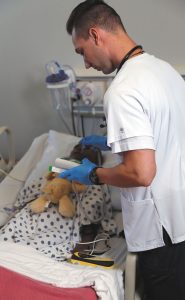By Dr. Charene Adams, DNP, MSN, RN-BC, CDP, Director of Nursing, Hodges University
 When we need them, they are there. From that first breath to the last, they are there. Nurses are the professionals that patients interact with the most. Nurses provide the expert care that patients need and deserve, and that care extends to the patient’s family. As a matter of fact, the American Nurses Association states that nurses are indispensable when it comes to safeguarding public health.
When we need them, they are there. From that first breath to the last, they are there. Nurses are the professionals that patients interact with the most. Nurses provide the expert care that patients need and deserve, and that care extends to the patient’s family. As a matter of fact, the American Nurses Association states that nurses are indispensable when it comes to safeguarding public health.
Nurses learn that their profession is a balance of art and science. The art is their ability to assess a patient’s emotional state. The science is, of course, is the assessment of a patient’s physical state. Patients need to be treated as an individual, looking at them as a whole, and not just their physical ailment.
In the past few years, there has been a national spotlight on the shortage of nurses. In the state of Florida, the Florida Hospital Association predicts there will be a shortage of almost 60,000 nurses in the state by the year 2035. In the Southwest Florida region, there are currently 726 openings for registered nurses (RNs).
The Institute of Medicine’s (IOM) 2010 report stated that there is a need to increase the percentage of nurses with a bachelor’s of science in nursing (BSN) degree to 80 percent by the year 2020. The research showed that nurses with a BSN degree means patients have better clinical outcomes and a lower mortality rate.
Why?
The American Association of Colleges of Nursing (AACN) released “The Impact of Education on Nursing Practice” in 2014 that found that nurses with a BSN have increased skills in communication, leadership, professional integration as well as research and evaluation. This extra knowledge and expertise leads to better patient care.
As a matter of fact, the Veterans Administration (VA) has enacted a policy that requires RNs to have a BSN in order to be considered for promotion beyond entry level, and all branches of the United States Armed Forces now require a BSN or higher to practice as an active duty RN. Additionally, many healthcare facilities have begun requiring RNs to have a BSN for entry level nursing positions.
Nurses who have their BSN degree can see both increases in hourly pay rates faster than those with an associate degree, and they will have a better and faster track of pursuing senior positions, including nurse managers, nursing directors, and other leadership roles.
At Hodges University, we have a BSN program that is designed to educate, train, and graduate nursing students in four semesters. Our students have the advantage of learning from professionals in the field, and applying what they learn in our modern simulation labs, and in clinical rotations. They graduate with their bachelor’s degree, fully prepared to take the NCLEX exam for their RN.
Hodges University is also designing an accelerated, online RN-BSN program for RNs that want and/or need their BSN degree. It can be completed in one year. Our plans are to launch this in the Fall of 2023, pending approval from our regional accreditor, SACSCOC.
Hodges Univeristy
239-938-7744 | Hodges.edu










